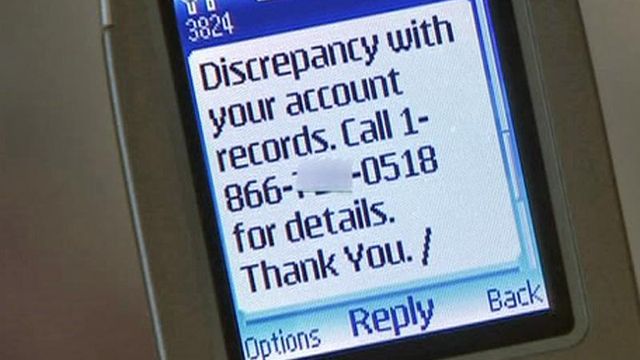Woman feels 'sick' over smishing theft
"Smishing" is the latest way in which thieves are stealing money from bank accounts.
Posted — UpdatedCriminals are great at adapting to technology. They used to use fax machines, then the Internet and now text messages. They want to catch us off guard and scare us into giving them personal information that we wouldn't dream of passing along.
Nancy Smith said she heard that text message alert tone and checked her phone.
“Discrepancy with your account records. Call (the phone number) for details,” the text said.
It was supposedly from Wachovia. At first, Smith said she didn't know what to think.
“I just thought it was so bizarre that they would be doing it by text, you know, when they have a phone number for me. But it still didn't really register and it said discrepancy, so I thought this is something I really need to take care of right away,” she said.
So Smith called the number, and got an automated response.
“It answers Wachovia. Enter the card you're calling about. Enter your last four (numbers) of your social. A lot of people ask you that nowadays,” Smith said. “Then they asked me my PIN and I just rattled it right off, punched it right in, and I'm like, ‘Oh no, I think you made a big booboo here.’”
The next day, she checked her account online and found she had lost a total of $700.
“I just about died is what I thought,” she said. “I had just written all my monthly bills, and all I could think about was all these checks are going to start bouncing, you know, and charge fees for that and all that stuff.”
Smith is a victim of "smishing.” It's like "phishing" because it uses bait to get you to provide your personal information. But instead of sending a bogus e-mail, it's a phony text message. Fraudsters send out thousands of messages using popular bank names. When someone bites, they use the information to make duplicate bank cards.
“Oh I was sick. I was sick,” Smith said.
When Smith called Wachovia directly, they immediately returned her money. Now, she just wants to warn others.
The problem is not limited to Wachovia or Wachovia customers. Other recent messages name Bank of America and the State Employees Credit Union, but the thieves could mention any bank.
This is yet another reminder of why you should always be skeptical of any request for your personal information unless you are the one who made independent contact with the business.
• Credits
Copyright 2024 by Capitol Broadcasting Company. All rights reserved. This material may not be published, broadcast, rewritten or redistributed.





